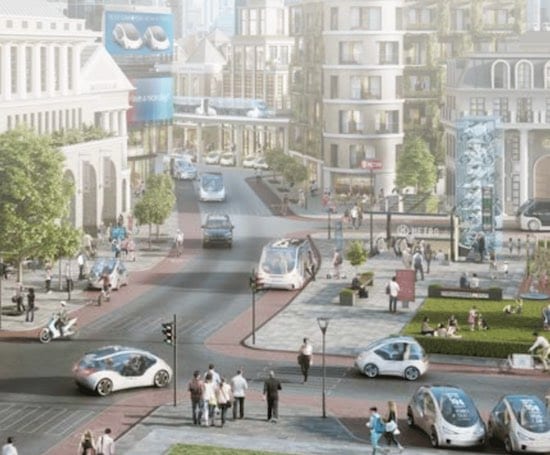Australia’s transport industry is on the cusp of “radical change,” a new report has warned, that must be embraced by business and policy makers, or else risk a train-wreck of disruption that could wipe out trillions of dollars across the transportation and energy industries.
The 65-page report – Transporting the Future: A Business Perspective on Future Mobility – heralds a not-too-distant era where mobility will be “cheap, door to door personalised and ‘on demand’.”
In this scenario, it says, the boundaries between private, shared, and public transport “will be blurred, possibly eliminated, and recast.”
Transport options, says the report, will be multi-modal, connected, autonomous and electric with “service providers” delivering the entire travel experience via sophisticated digital platforms.
And the Australian ideal of car ownership will go the way of the picket fence, the perfectly mowed nature strip, and the big back yard – with the majority likely to opt for the “far more economic option” of shared and public transport.
“Mobility is on the cusp of radical change,” said Andrew Petersen, CEO of Sustainable Business Australia, whose research forms the basis of the report. “New technology and business models are combining to profoundly change how people and goods move about.”
Already, we are seeing this happen, with companies like Uber recently launching its ride-share service in Sydney, and IKEA in France offering customers electric vehicles for hire from its car parks, in partnership with Renault.
Meanwhile, the world’s tech heavyweights – including Apple, Google and Tesla – are busily developing and testing autonomous vehicle technology, which promises to transform public and freight transport first, and then perhaps even the way we drive our own cars.
But the NRMA-backed report also warns that a smooth transition to this new – and improved – world of mobility is not a given, and will need strong support from both governments and business.
Like the clean energy transition is currently demonstrating, the failure of governments and businesses to embrace and adapt to the changes gripping the transport sector could make the transition a messy one, and much more painful for some.
And, in light of the dismal failure, thus far, of Australian governments to embrace a shift to electric vehicles, it’s a message that bears repeating.
“A sustainable transport future for Australia is possible and requires a deliberative and ambitious shift from the status quo along a defined policy agenda,” said Petersen in comments on Friday.
“Autonomous vehicles, electric vehicles and shared mobility can reduce carbon emissions, other airborne particulates, congestion and road accidents and improve accessibility.
“A key concern identified is that, without a considered policy direction, future mobility may also exacerbate existing social and environmental impacts.
“A transport system dominated by private autonomous travel could increase journeys and vehicles on the road, which would result in Australia not realising the full potential this technology could
offer.”
But the report – which is part of the SBA’s three-year Sustainable Mobility Project* – makes its strongest appeal to business, which it says is a “uniquely placed co-collaborator in the delivery of a sustainable mobility future.”
For some businesses, it says, future mobility will create substantial new business opportunities, through new markets worth billions of dollars across many sectors.
For others – including energy companies, transport companies, auto manufacturers, and the oil industry – the focus will be on identifying and avoiding major risks resulting from the disruption, the report warns.
“Some commentators see the ensuing disruption as destroying trillions of dollars of investor value across the transportation and energy industries, but also creating trillions of dollars in new business opportunities, consumer surplus and GDP growth,” it says.
“Business needs to critically evaluate how these opportunities are relevant.
“Some in particular will need to identify and avoid major risks … while associated vertical businesses including car parking, insurance, car leasing and dealerships, logistics, as well as transport oriented agencies, will have to make some challenging decisions and actions ahead in order to reframe their relevance and role.”
And while SBA argues that business must take a leadership position on action and solutions on mobility, it also stresses the importance of collaboration between the public and private sectors.
“A sustainable transport future for Australia requires a deliberative and ambitious shift from the status quo along a defined policy agenda,” the report says.
“To take full advantage of the benefits of future mobility, the public and private sectors need to work together to catalyse business action, and ensure the right enabling environment to deliver solutions promoting a sustainable future mobility.
“This can and should work across a variety of scales including business inclusion in transport planning, and government catalysing business action through innovation hubs and transport management programs.”
*SBA’s Sustainable Mobility Project is chaired by NRMA and includes SBA Members, AGL, Downer, Energetics, Jacobs, and IAG. It is part of the World Business Council on Sustainable Development (WBCSD) global sustainable mobility project, which has been implemented in Asia, Europe and South America.







